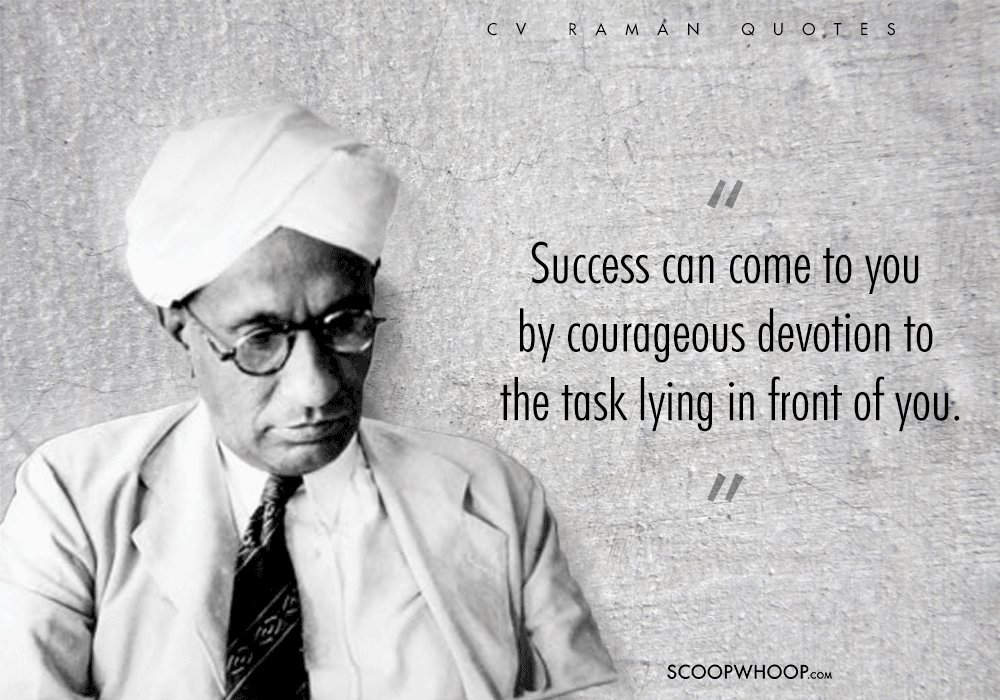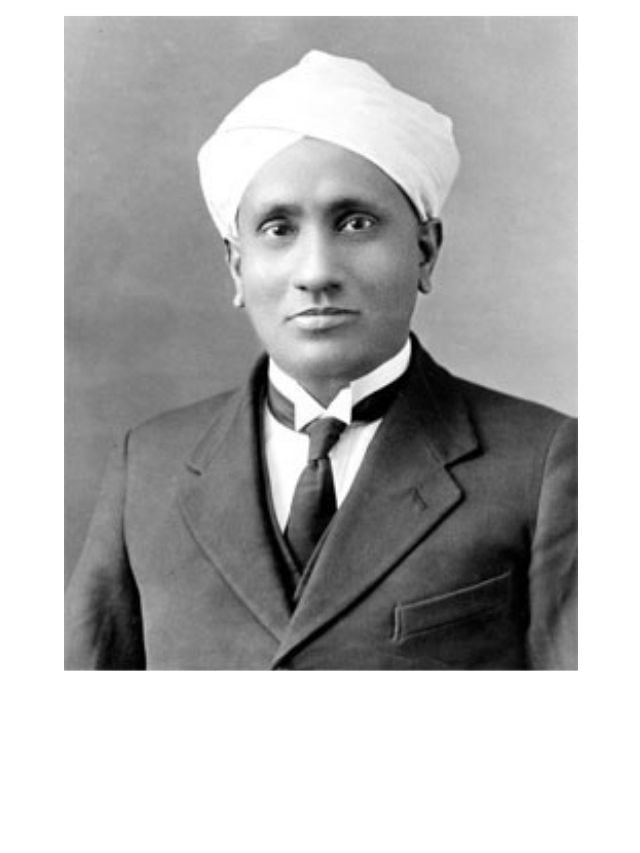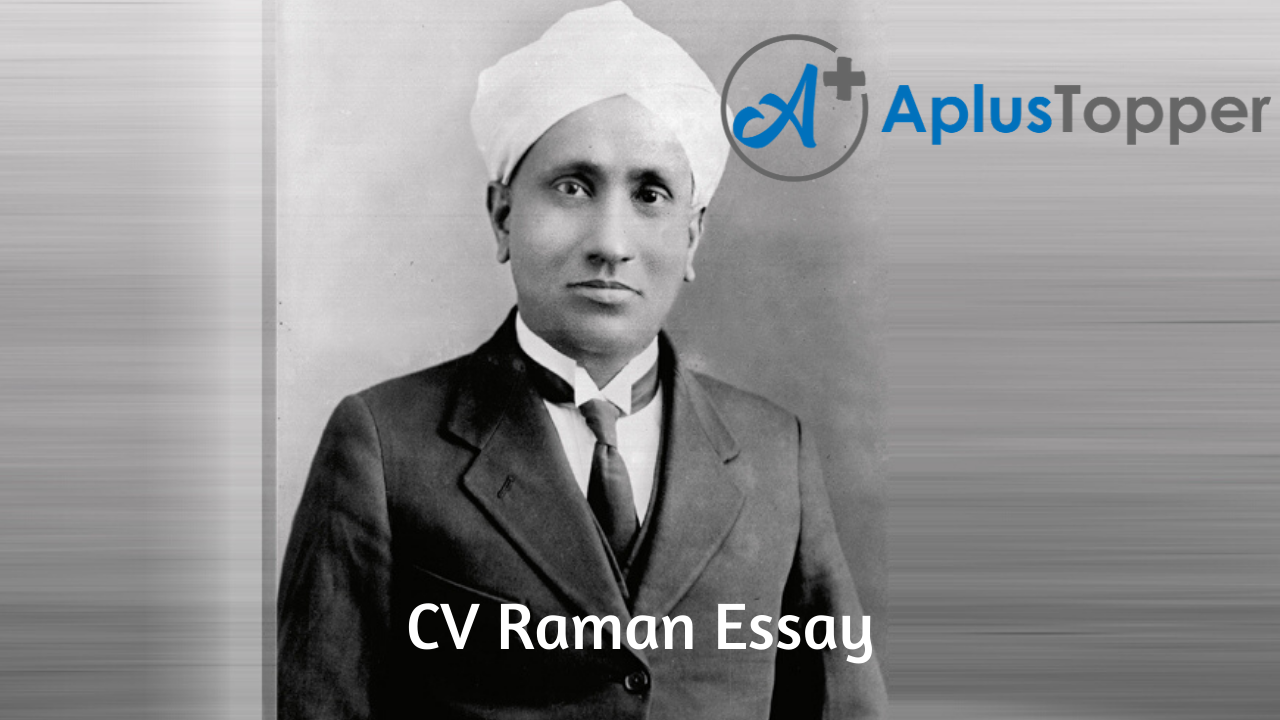
10 Lines on Dr. CV Raman in EnglishShort Essay on DrCV Raman YouTube
10 Lines about CV Raman. CV Raman was a famous Indian scientist. He was born in 1888 in Tamil Nadu. He studied physics and mathematics in college. Raman discovered the "Raman Effect" in 1928. It's about how light changes when passing through matter. He won the Nobel Prize for Physics in 1930. Raman was the first Asian to win this prize.

CV Raman Quotes
CV Raman or Chandrasekhara Venkata Raman is one of India's most renowned physicists who discovered the Raman Effect. He was the first Indian to win the Nobel Prize in Physics in 1930. Dr CV Raman was very good at academics as he sought inspiration from his father who was a reputed lecturer of mathematics and physics.He was born in Tiruchirappalli on 7 November 1888.

10 Lines On CV Raman • 10 Lines Essay
Are you looking for a video on CV Raman? You are in the right place. This video provides you with 10 lines on CV Raman in English.It is very easy to unders.

"Stunning Collection of Full 4K CV Raman Images More than 999 to Explore!"
Want to have 10 simple lines on CV Raman? You are in the right place! This video provides you with a simple lines about CV Raman in English. It is very eas.

10 lines on Sir CV RAMAN in English // Essay on Sir CV RAMAN Go IT
100 Words On Essay On CV Raman. Since his father taught physics and mathematics at AV Narasimha Rao College in Visakhapatnam, CV Raman was raised in an academic environment. Raman was a dedicated student. He enrolled in the Presidency College in Madras in 1902, and in 1904 he successfully completed his BA programme, earning first place and a.

Famous Scientists C V RAMAN Educational Portal in Telugu , Free Competitive Exam Guidance
He was Born on 7 November 1888. He was from Tamil Brahmin Family. His father was a teacher at a local high school. He is known for his work in the field of light scattering. Raman received the 1930 Nobel Prize in Physics. The Raman effect was discovered on 28 February 1928. He was the first Asian to receive a Nobel Prize in any branch of science.

10 Lines on CV Raman
Sir C.V. Raman was a brilliant researcher. He was awarded the Nobel Prize for his work on light scattering and the discovery of the Raman Effect. The government offered him 25 acres of land to continue his research. Sir C.V. Raman's dream child was the Raman Institute. He was born in Trichy on November 7th, 1888.

सी.वी. रमन पर निबंध हिंदी में (CV Raman essay in Hindi)
Further, the intensity of the spectral lines was related to the amount of the substance. Raman spectroscopy could be applied not only to liquids but also to gases and solids.. are using laser Raman techniques to record the spectra of transient chemical species with lifetimes as small as 10-11 seconds. Surface-enhanced Raman spectroscopy is.

10 Lines On CV Raman In English CV Raman 10 Lines Short Biography In English YouTube
Lived 1888 - 1970. C. V. Raman discovered that when light interacts with a molecule the light can donate a small amount of energy to the molecule. As a result of this, the light changes its color and the molecule vibrates. The change of color can act as a 'fingerprint' for the molecule. Raman spectroscopy

10 Lines On CV RAMAN In English/CV raman 10 lines short biography in english Go IT
00:00. 00:00. Chandrasekhara Venkata Raman was born at Trichinopoly in Southern India ON November 7th, 1888. His father was a lecturer in mathematics and physics so that from the first he was immersed in an academic atmosphere. He entered Presidency College, Madras in 1902, and in 1904 passed his B.A. examination, winning the first place and.

CV Raman Education Nobel Prize Winner in Physics Leverage Edu
C. V. Raman was born in Tiruchirappalli in the Madras Presidency of British India (now Tiruchirapalli, Tamil Nadu, India) to Tamil parents, [4] Chandrasekhara Ramanathan Iyer and Parvathi Ammal. [5] He was the second of eight siblings. [6] His father was a teacher at a local high school, and earned a modest income.

CV Raman Essay Essay on CV Raman for Students and Children in English A Plus Topper
9. Raman's discoveries in optics and acoustics have had a profound impact on the world of physics. 10. Sir C.V. Raman's legacy continues to inspire young scientists to pursue excellence in the field of science. 10 Lines on CV Raman in English for Class 3. 1. Sir C.V. Raman was a brilliant Indian physicist born on November 7, 1888. 2.

10 Lines on CV Raman in English Few Lines on CV Raman YouTube
10 Lines On C V Raman. Exploring the life of a great scientist can be both educational and exciting, especially for younger students. In our 10 lines about CV Raman, we aim to capture the essence of his achievements in a concise yet engaging way. This section is particularly tailored as an essay for lower primary classes, offering a simple yet.
-(1).png)
Sir C. V. Raman The Pioneer Of Modern Science In India
C.V. Raman (born November 7, 1888, Trichinopoly, India—died November 21, 1970, Bangalore) Indian physicist whose work was influential in the growth of science in India.He was the recipient of the Nobel Prize for Physics in 1930 for the discovery that when light traverses a transparent material, some of the light that is deflected changes in wavelength.

10 Simple Lines on CV Raman Simple Essay on CV Raman in English Simple Speech about CV Raman
Meet Sir CV Raman, Sir Chandrasekhara Venkata Raman born on 7th November 1888 was a brilliant scientist who loved studying light and its behavior. He was so good at it that he won a big prize called the Nobel Prize, becoming the first Indian to do so in his field! About Sir Raman, He came from a family that really valued education, and he did very well in school.

CV Raman Quotes
Chandrasekhara Venkata Raman was born to a Tamil Brahmin family in Tiruchirapalli, Tamil Nadu, on November 7, 1888. Raman's forefathers were agriculturists who settled in the Tanjore district near Porasakudi Village and Mangudi. Chandrasekhara Iyer, his father, attended a school in Kumbakonam and graduated with honours in 1881.